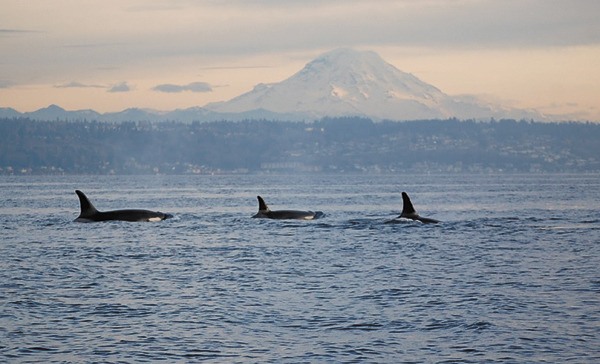The Puget Sound’s famed southern resident orcas have been no strangers to Vashon lately, making three dramatic passes by the Island in a week and a half. Each time — on Nov. 24 and 27 and Dec. 3 — news of the whales drew crowds of Islanders to Point Robinson, where groups of 20 to 45 orcas, mostly from the J and K pods, delighted onlookers with their trademark moves — tail slaps, spy hops and awe-inspiring breaches. On Tuesday, Nov. 27, nice weather made for especially pleasant whale watching and what amounted to a truly Northwest scene as several of the whales stopped and lingered under a clear, looming Mt. Rainier.
As Islanders reveled in the whales’ winter visits, the federal government announced on Nov. 26 that it would consider removing the southern residents from the endangered species list. According to news reports, the whales’ endangered status review by NOAA Fisheries is in response to a petition by California farmers who have suffered from irrigation cutbacks put in place to protect fish the whales feed on. The petition, filed by a Sacramento-based nonprofit, argues that the local whales are part of a 50,000 worldwide population that is thriving as a whole.
Ann “Orca Annie” Stateler of the Vashon Hydrophone Project called the proposal a “horrible idea,” saying the southern residents, like other groups of orcas around the world, are a genetically distinct species with their own body type, language and feeding habits, and they need individual protection. What’s more, she said, their population still hasn’t reached the size necessary for a healthy level of genetic diversity. She noted that six whales have died this year.
“They’re moving in the wrong direction. … They are far from the recovery goal,” she said.



